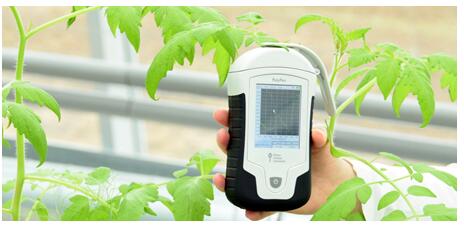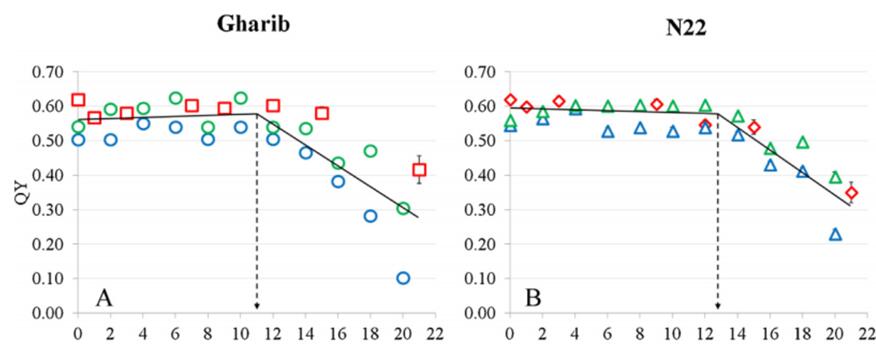
时间:2021-03-04
作者:易科泰
点击量:
简介:
FP-leaf叶夹式植物光谱与叶绿素荧光测量包用于测量叶片水平的植物叶绿素荧光、叶片反射光谱及光谱指数等,包括手持式叶绿素荧光测量仪和植物反射光谱测量仪。适于野外大量样品的快速检测,广泛应用于植物胁迫响应、除草剂检测,生态毒理生物检测、植物反射光谱测量、色素组成变化、氮素含量变化、产量估测、生态学、分子生物学等。

测得的数据以图形或数据表的形式实时显示在仪器的显示屏上。这些数据都可以储存在仪器的内存里并传输到电脑里。测量仪由可充电锂电池供电,不需要使用电脑即可独立进行测量。测量仪配备全彩色触屏显示器、内置光源、内置GPS和用于固定样品的无损叶夹。
应用领域
适用于光合作用研究和教学,植物及分子生物学研究,农业、林业,生物技术领域等。研究内容涉及光合活性、胁迫响应、农药药效测试、突变筛选、色素含量评估等。

功能特点


技术参数
1. 测量参数及程序
1.1 叶绿素荧光测量包括F0、Ft、Fm、Fm’、QY、QY_Ln、QY_Dn、NPQ、Qp、Rfd、PAR(限PAR型号)、Area、Mo、Sm、PI、ABS/RC等50多个叶绿素荧光参数
1.2 叶绿素荧光OJIP–test包括F0、Fj、Fi、Fm、Fv、Vj、Vi、Fm/F0、Fv/F0、Fv/Fm、Mo、Area、Fix Area、Sm、Ss、N、Phi_Po、Psi_o、Phi_Eo、Phi–Do、Phi_Pav、PI_Abs、ABS/RC、TRo/RC、ETo/RC、DIo/RC等
1.3 叶绿素荧光测量程序:Ft、QY、OJIP、NPQ1、NPQ2、NPQ3、LC1、LC2、LC3、PAR(限PAR型号)、Multi无人值守自动监测
1.4 植被反射指数:NDVI、SR、绿度指数、MCARI、TCARI、TVI、ZMI、SRPI、NPQI、PRI、NPCI、Carter指数、SIPI、GM1、SR、MCARI1、OSAVI、MCARI、Ctr2、GM2(视具体型号而定)
2. 手持式叶绿素荧光测量单元:
2.1 叶夹类型:固定叶夹式、分离叶夹式、探头式等
2.2 PAR传感器:80º入射角余弦校正,读数单位µmol(photons)/m².s,可显示读数,检测范围400-700 nm
2.3  测量光:每测量脉冲最高0.09µmol(photons)/m².s,10-100%可调
测量光:每测量脉冲最高0.09µmol(photons)/m².s,10-100%可调
2.4 光化学光:10-1000µmol(photons)/m².s可调
2.5 饱和光:最高3000µmol(photons)/m².s,11-100%可调
2.6 光源:标准配置蓝光455nm,可根据需求配备不同波长的LED光源
2.7 尺寸大小:超便携,手机大小,134×65×33mm(不包括探头),重量仅188g
2.8 数据存储:容量16Mb,可存储149000数据点
2.9 显示与操作:图形化显示,双键操作,待机5分钟自动关闭
2.10 供电:2000mA可充电锂电池,USB充电,可连续工作48小时,低电报警
2.11 工作条件:0–55℃,0–95%相对湿度(无凝结水)
2.12 存贮条件:-10–60℃,0–95%相对湿度(无凝结水)
2.13 通讯方式:蓝牙 + USB双通讯模式,蓝牙在20m距离最大传输速度3Mbps
2.14 GPS模块:内置,最高精度1.5m
2.15 软件:FluorPen1.1专用软件,用于数据下载、分析和图表显示,输出Excel数据文件及荧光动力学曲线图
3. 手持式植物反射光谱单元
3.1 光谱检测范围:
PolyPen RP 410 UVIS光谱响应范围为380-790nm
PolyPen RP 410 NIR光谱响应范围为640-1050nm

3.2 光源:氙气白炽灯380-1050nm
3.3 光谱响应半宽度:8nm
3.4 光谱杂散光:-30dB
3.5 光学孔径:7mm
3.6 扫描速度:约100ms
3.7 触控屏:240×320像素,65535色
3.8 内存:16MB(可存储4000组以上测量数据)
3.9 系统数据:16位数模转换
3.10 动态范围:高增益 1:4300;低增益 1:13000
3.11 内置GPS模块:最大精度<1.5m
3.12 通讯方式:USB
3.13 软件功能:自动计算内置植被指数、计算用户自定义植被指数、实时显示数据图和数据表、数据导出为Excel、GPS地图、固件升级,Windows XP及以上系统适用
3.14 光谱反射标准配件(选配):提供最高的漫反射值(99%)。光谱平面涵盖UV-VIS-NIR光谱,保证+/-1%的光学平面。用于光源和检测器的校准。
3.15 尺寸:15×7.5×4cm
3.16 重量:300g
3.17 外壳:防水溅外壳
3.18 电池:2600mAh可充电锂电池,通过USB接口连接电脑充电
3.19 续航时间:可连续测量48小时
3.20 工作条件:温度0~55℃,相对湿度0-95%(无冷凝水)
3.21 存放条件:温度-10~60℃,相对湿度0-95%(无冷凝水)
应用案例 1:

欧盟委员会联合研究中心通过无人机遥测技术研究叶缘焦枯病菌在橄榄树中的感染。同时通过FluorPen叶绿素荧光仪和RP400光谱仪直接检测叶片的叶绿素荧光和反射光谱植被指数,用于对照修正无人机遥测数据。研究结果发表在《Nature Plants》(Zarco-Tejada,2018)。
应用案例 2:
水稻灌浆期的夜间高温会显著影响水稻的产量。捷克科学院全球变化研究中心与国际水稻研究所合作研究夜间高温对成熟水稻穗光学特性的变化追踪。研究者使用FluorPen手持式叶绿素荧光仪测量了光合系统有效光化学效率ΦII(也称为有效量子产额QY或ΦPSII)和稳态荧光Fs。同时使用PolyPen手持式植物反射光谱测量仪的前期型号WinePen测量了反射光谱曲线,并计算了PRI、mSR705、mND705、R470/R570、R520/R675等9项植被指数。这些植被指数与水稻叶片/穗的光合能力、稳态荧光、叶绿素浓度等紧密相关(Gil-Ortiz R et al. 2020)。

图1. 不同品种水稻的有效量子产额QY时间趋势

图2. 反射植被指数与叶绿素荧光参数的线性回归系数
参考文献
1. Singh, S., Mohan Prasad, S. & Pratap Singh, V. Additional calcium and sulfur manages hexavalent chromium toxicity in Solanum lycopersicum L. and Solanum melongena L. seedlings by involving nitric oxide. Journal of Hazardous Materials 398, 122607 (2020).
2. Ariyarathna, R. a. I. S., Weerasena, S. L. & Beneragama, C. K. Application of Polyphasic OJIP Chlorophyll Fluorescent Transient Analysis as an Indicator for Testing of Seedling Vigour of Common Bean (Phaseolus vulgaris L.). Tropical Agricultural Research 31, 106–115 (2020).
3. Prity, S. A. et al. Arbuscular mycorrhizal fungi mitigate Fe deficiency symptoms in sorghum through phytosiderophore-mediated Fe mobilization and restoration of redox status. Protoplasma (2020) doi:10.1007/s00709-020-01517-w.
4. Rahman, M. A. et al. Arbuscular Mycorrhizal Symbiosis Mitigates Iron (Fe)-Deficiency Retardation in Alfalfa (Medicago sativa L.) Through the Enhancement of Fe Accumulation and Sulfur-Assisted Antioxidant Defense. International Journal of Molecular Sciences 21, 2219 (2020).
5. Vitorino, L. C. et al. Biocontrol Potential of Sclerotinia sclerotiorum and Physiological Changes in Soybean in Response to Butia archeri Palm Rhizobacteria. Plants 9, 64 (2020).
6. Kasampalis, D. S., Tsouvaltzis, P. & Siomos, A. S. Chlorophyll fluorescence, non-photochemical quenching and light harvesting complex as alternatives to color measurement, in classifying tomato fruit according to their maturity stage at harvest and in monitoring postharvest ripening during storage. Postharvest Biology and Technology 161, 111036 (2020).
7. Soares, J. S., Santiago, E. F. & Sorgato, J. C. Conservation of Schomburgkia crispa Lindl. (Orchidaceae) by reintroduction into a fragment of the Brazilian Cerrado. Journal for Nature Conservation 53, 125754 (2020).
8. Poblete, T. et al. Detection of Xylella fastidiosa infection symptoms with airborne multispectral and thermal imagery: Assessing bandset reduction performance from hyperspectral analysis. ISPRS Journal of Photogrammetry and Remote Sensing 162, 27–40 (2020).
9. Chiluwal, A. et al. Deterioration of ovary plays a key role in heat stress-induced spikelet sterility in sorghum. Plant, Cell & Environment 43, 448–462 (2020).
10.Maai, E., Nishimura, K., Takisawa, R. & Nakazaki, T. Diurnal changes in chloroplast positioning and photosynthetic traits of C4 grass finger millet. Plant Production Science 0, 1–13 (2020).
11.De Micco, V. et al. Dust accumulation due to anthropogenic impact induces anatomical and photochemical changes in leaves of Centranthus ruber growing on the slope of the Vesuvius volcano. Plant Biol J 22, 93–102 (2020).
12.Gil-Ortiz R et al. 2020. New Eco-Friendly Polymeric-Coated Urea Fertilizers Enhanced Crop Yield in Wheat. Agronomy 10: 438
13.Zarco-Tejada, P. J., Camino, C., Beck, P. S. A., Calderon, R., Hornero, A., et al. 2018. Previsual symptoms of Xylella fastidiosa infection revealed in spectral plant-trait alterations. Nature Plants, 4(7), 4 ts, 4(7), 432–439.
14.Poblete, T., Camino, C., Beck, P. S. A.,A., Hornero, A., et al. 2020. Detection of Xylella fastidiosa in fastidiosa infection symptoms with airborne multispectr tral and thermal imagery: Assessing bandset redu eduction performance from hyperspectral analysis. ISPRS Journal of urnal of Photogrammetry and Remote Sensing, 162, 27–40.
15.Junker L. V., Rascher U., Jaenicke H., et al. 2019. Detection of plant stress responses in aphid-infested lettuce using non-invasive detection methods. Integrated Protection in Field Vegetables IOBC OBC-WPRS Bulletin Vol.142, 2019 . 8-16 8
16.Wu, L.B., Holtkamp, F., Wairich, A., & Frei, M. 2019. Potassium Ion Channel Gene OsAKT1 Affects Iron Translocation in Rice Plants Exposed to Iron Toxicity. Frontiers in Plant Science, 10.
17.Bartak, M., Hajek, J., Morkusova, J., et al. 2018. Dehydration-induced changes in spec pectral reflectance indices and chlorophyll fluorescence of Antarctic e of Antarctic lichens with different thallus color, and intrathall intrathalline photobiont. Acta Physiologiae Plantarum, 40(10 10).
18.Bartak, M., Mishra, K.B., Mareckova A, M. 2018. Spectral reflectance indices sense desiccation induced changes in the thalli of Antarctic lichen Dermatocarpon polyphyllizum. Czech Polar Reports 8 (2): 249-259.
19.Gálvez, S., Mérida-García, R., Camino Ino, C. et al. 2018. Hotspots in the genomic architectu hitecture of field droughtresponses in wheat as breeding targets. Functional & Integrative Genomics.
20.Nuttall, J. G., Perry, E. M., Delahunt Ty, A. J. et al. 2018. Frost response in wheat and early detection using proximal sensors. Journal of Agrono f Agronomy and Crop Science, 205(2), 220–234.
21.Sytar O., Zivcak M., Olsovska K., Breststic M. 2018 Perspectives in High-Throughput Phenotyping of Qualitative Traits at the Whole-Plant Level. In: Sengar R., Singh A. (eds) Eco-friendly Agro-biolog logical Techniques for Enhancing Crop Productivity. Springer, Singapore.